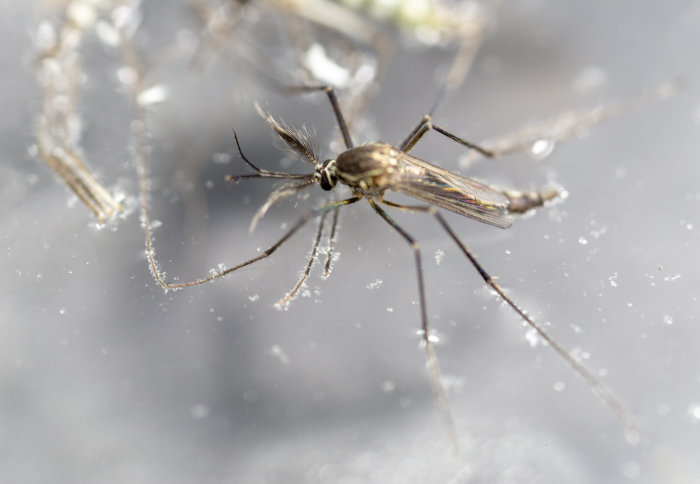Malaria milestone and using light to hear: News from the College

Here’s a batch of fresh news and announcements from across Imperial.
From an important step towards malaria elimination, to experimenting with light to help us hear better, here is some quick-read news from across the College.
Testing modified mosquitos
 Genetically engineering certain species of mosquito is one potential new technique to boost malaria elimination efforts. However, scientists want to make sure they know how any modified mosquitos might behave in the wild.
Genetically engineering certain species of mosquito is one potential new technique to boost malaria elimination efforts. However, scientists want to make sure they know how any modified mosquitos might behave in the wild.
Now, researchers from Imperial, LSTM, the University of Perugia, the University of Oxford and the Centers for Disease Control and Prevention have followed groups of modified mosquitos in large cages that mimic real environments.
The mosquitos were modified to pass on a trait that makes more of the next generation male. The new study revealed that in larger spaces the mosquitos interacted in such a way that populations were up to 80% male, a figure that could reduce females in local wild populations to a point where malaria transmission may fall.
For more details, read the full paper in Parasites & Vectors.
Good vibrations

The Department of Bioengineering’s Dr Andriy Kozlov won a Wellcome Trust Investigator Award in January. The funding of £920,000 over five years will further his exploration of hearing at the cellular level, focusing on the tiny hairs, or stereocilia, inside the ear, and how they vibrate to help us hear.
For example, Dr Kozlov and his lab will try to make stereocilia vibrate using light instead of sound waves.
He said: “We will build new instruments to move stereocilia with light, using the same physical principle that causes a comet’s tail to bend away from the Sun. This work promises to shed light on fundamental aspects of the biophysics of hearing.”
Teaching teachers
 Over 10 London science teachers visited Imperial College London’s Central Biomedical Services division, where animal research is carried out. Sixth-form students have had similar visits, but this was the first time for a group of teachers.
Over 10 London science teachers visited Imperial College London’s Central Biomedical Services division, where animal research is carried out. Sixth-form students have had similar visits, but this was the first time for a group of teachers.
At Imperial, animals are only used in research programmes where their use is shown to be necessary and unavoidable. The scientists working with animals are supported by a team of animal technologists and vets, responsible for maintaining high levels of animal welfare. Staff, training and facilities are geared towards excellent animal welfare.
The event, part of a unique collaboration between CBS and the College’s Outreach team, aimed to dispel myths regarding animal research and help teachers have conversations with students about animal research and related careers. The group learnt the importance of work done with animals, before having a tour of the facilities.
MP visit
 Rebecca Long-Bailey MP, the Shadow Secretary of State for Business, Energy and Industrial Strategy, visited Imperial on Wednesday to give a talk hosted by the College’s student Labour Society.
Rebecca Long-Bailey MP, the Shadow Secretary of State for Business, Energy and Industrial Strategy, visited Imperial on Wednesday to give a talk hosted by the College’s student Labour Society.
Ms Long-Bailey joined a panel of speakers on the topic of “Building a Green New Deal for the Many”, where participants discussed how political movements might raise the profile of policies that tackle climate change and invest in green jobs.
(Image credit: Chris McAndrew, CC3.0)
Academy accolade

Professor Molly Stevens of the Departments of Materials and Bioengineering has been elected as a Foreign Member to the US National Academy of Engineering.
The election, which makes Professor Stevens one of 272 ‘foreign members’ of the Academy, recognises her contributions to materials-based approaches for tissue regeneration and biosensing.
Election to the US National Academy of Engineering is among the highest professional distinctions accorded to an engineer. Professor Stevens will be inducted during a ceremony at the NAE's annual meeting in Washington, D.C., in October.
Speaking about her appointment, Professor Stevens said: “I am hugely grateful to my team of talented Postdocs and students as well as to our fantastic collaborators. The progress we make is a real team effort.”
Startup scoops top prize

CustoMem, a student-founded startup developing a new biomaterial to capture and recycle hazardous micropollutants from industrial wastewater, took home ‘Technology Business of the Year' at the West London Business Awards 2019.
CustoMem was co-founded by Henrik Hagemann and Gabi Santosa while they were students at Imperial and were one of the first tenants to join the White City Incubator in 2017. Last year they received a €1.4m grant from the EU’s Horizon 2020 programme to bring their product to market, and they have previously been supported by EIT Climate-KIC, based at the Grantham Institute – Climate Change and The Environment.
Workspace provider Central Working White City was also among the prize-winners as they collected ‘Co-working Space of the year’. Located in the I-HUB, Central Working provides businesses of all sizes with the environment, community and support to thrive.
–
Want to be kept up to date on news at Imperial?
Sign up for our free quick-read daily e-newsletter, Imperial Today.

Article text (excluding photos or graphics) © Imperial College London.
Photos and graphics subject to third party copyright used with permission or © Imperial College London.
Reporter
Andrew Youngson
Communications Division
Dan West
Estates Division
Hayley Dunning
Communications Division
Caroline Brogan
Communications Division